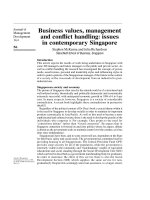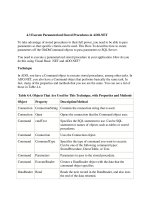Realism in american literature ppt
Bạn đang xem bản rút gọn của tài liệu. Xem và tải ngay bản đầy đủ của tài liệu tại đây (221.82 KB, 13 trang )
Realism in American
Literature
1865-1914
Lecture Objectives
•
To gain an overview of the historical context and literary
concerns of Realism
American Literature
The
Puritan
Era
1600 - 1750
Age of
Reason
1750-1800
Realism
Romanticism
Transcendentalism
1800-1840
1840-1855
1865-1915
Contemporary and
Post-Modern Period
Modernism
1916-1946
1946 – Present
The Civil War
•
A nation divided
•
Interrupts Transcendentalism
•
Walt Whitman
– Transition writer: late Transcendental poet,
early Realist
– Leaves of Grass
– “O Captain, My Captain”
Historical Context
• Population of the United States is growing rapidly.
(1865 -1915)
• Science, industry and transportation are expanding.
• Literature also was growing, but most new writers
were not Romantics or Transcendentalists. They are
Realists.
• The “Frontier” did not exist as before; its legacy
changed and impacted Realists in its new form.
• The aftermath of the Civil War meant that Americans
were less certain and optimistic about the future.
• The idealism of the Romantics and philosophy of
Transcendentalists seemed out of date and
irrelevant to many readers.
Realism vs. Romanticism
“The trapper was
placed on a rude seat
which had been made
with studied care…
His body was placed
so as to let the light
of the setting sun fall
full upon the solemn
features. His head
was bare, the long
thin locks of gray
fluttering lightly in
the evening breeze. ”
He was most fifty and he
looked it. His hair was
long and tangled and
greasy, and you could
see his eyes shining
through…there warn’t
no color in his face; it
was white…a white to
make a body sick…a
tree-toad white, a fish
belly white. As for his
clothes, just rags,
that’s all.
Realism in American Literature
• The purpose of the writing is “to instruct
and entertain”
• Character is more important than plot.
• Subject matter is drawn from real life
experience.
• The realists reject symbolism and
romanticizing of subjects.
• Settings are usually those familiar to the
author.
• Plots emphasized “the norm of daily
experience”
• Ordinary characters
Some Writers from Realism
• Stephen Crane
– The Red Badge of Courage
• Willa Cather
– O Pioneers!
– My Antonia
• Bret Harte “Outcasts of Poker Flats”
• Jack London
– The Call of the Wild
• Kate Chopin!
– Story of an Hour
• Mark Twain
– Life on the Mississippi
– The Adventures of Tom Sawyer
– The Adventures of Huckleberry Finn
Literary Style and Concerns
• Uniformity and diversity
• “The art of depicting nature as it is seen by
toads…and a story written by a measuring
worm.” ~ Ambrose Bierce
• Capturing the commonplace
• For Twain and other authors, narrative voice is
one of division – before and after war;
conventions versus personal conviction
• Writing in vernacular and local dialect
• Local stories
• Nature again
– Yes, its beauty, but also its hardship and how it wears the human
spirit down
Other Ideologies
•
God
•
Government
•
Education
•
Man’s Purpose in Life
•
American Dream
•
Evidence of Influence
Mark Twain
• Born as Samuel Longhorn Clemens,
November 30th, 1835 in Missouri.
• Traveled throughout the United
States during his adult life,
including to California and Europe.
• Much of his writing stemmed from
his travel and boyhood experiences.
• Was well known for his sense of
humor and his satirical writing
style.
• Died in 1910
Some Mark Twain Quotes:
• A man who carries a cat by the tail
learns something he can learn in no
other way.
• Age is an issue of mind over matter. If
you don't mind, it doesn't matter
• Classic: A book which people praise and
don't read.
• Don't let schooling interfere with your
education.
• Few things are harder to put up with
than the annoyance of a good example.
Mark Twain on slavery and
Huckleberry Finn
•
In those old slave-holding days the whole community was
agreed as to one thing:…the sacredness of slave property. To
help steal a horse or a cow was a low crime, but to help a hunted
slave…or hesitate to promptly betray him to the slave-catcher …
was a much baser crime, & carried with it a stain, a moral smirch
which nothing could wipe away. That this sentiment should exist
among slave-owners is comprehensible--there were good
commercial reasons for it--but that it should exist & did exist
among the paupers, the loafers the tag-rag & bobtail of the
community, & in a passionate & uncompromising form, is not in
our remote day realizable. It seemed natural enough to me then;
natural enough that Huck & his father the worthless loafer
should feel it & approve it, though it seems now absurd.
It shows that that strange thing, the conscience--the unerring
monitor--can be trained to approve any wild thing you want it to
approve if you begin its education early & stick to it.









